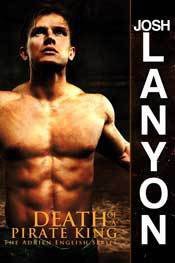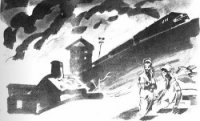A Death In The Family - Agee James (электронные книги без регистрации .TXT) 📗
"Dreadful," Catherine cried loudly.
"An idiot, or a cripple, or a paralytic," Andrew said. "Because another thing a concussion can do, Mary, is paralyze. Incurably. Those aren't fates you can prefer for anyone to dying. Least of all a man like Jay, with all his vigor, of body and mind too, his independence, his loathing for being laid up even one day. You remember how impossible it was to keep him quiet enough when his back was strained."
"Yes," she said. "Yes, I do." Her hands were still to her face and she was pressing her fingers tightly against her eyeballs.
"Instead…" Andrew began; and he remembered his face in death and he remembered him as he lay on the table under the glare. "Instead of that, Mary, he died the quickest and most painless death there is. One instant he was fully alive. Maybe more alive than ever before for that matter, for something had suddenly gone wrong and everything in him was roused up and mad at it and ready to beat it-because you know that of Jay, Mary, probably better than anyone else on earth. He didn't know what fear was. Danger only made him furious-and tremendously alert. It made him every inch of the man he was. And the next instant it was all over. Not even time to know it was hopeless, Mary. Not even one instant of pain, because that kind of blow is much too violent to give pain. Immediate pain. Just an instant of surprise and every faculty at its absolute height, and then just a tremendous blinding shock, and then nothing. You see, Mary?"
She nodded.
"I saw his face, Mary. It just looked startled, and resolute, and mad as hell. Not one trace of fear or pain."
"There wouldn't have been any fear, anyway," she said.
"I saw him-stripped-at the undertaker's," Andrew said. "Mary, there wasn't a mark on his body. Just that little cut on the chin. One little bruise on his lower lip. Not another mark on his body. He had the most magnificent physique I've ever seen in a human being."
Nobody spoke for a long while; then Andrew said, "All I can say is, when my time comes, I only hope I die half as well."
His father nodded; Hannah closed her eyes and bowed her head. Catherine waited, patiently.
"In his strength," Mary said; and took her hands from her face. Her eyes were still closed. "That's how he was taken," she said very tenderly; "in his strength. Singing, probably"-her voice broke on the word-"happy, all alone, racing home because he loved so to go fast and couldn't except when he was alone, and because he didn't want to disappoint his children. And then just as you said, Andrew. Just one moment of trouble, of something that might be danger-and was; it was death itself-and everything in his nature springing to its full height to fight it, to get it under control, not in fear. Just in bravery and nobility and anger and perfect confidence he could. It's how he'd look Death itself in the face. It's how he did! In his strength. Those are the words that are going to be on his gravestone, Andrew."
That's what they're for, epitaphs, Joel suddenly realized. So you can feel you've got some control over the death, you own it, you choose a name for it. The same with wanting to know all you can about how it happened. And trying to imagine it as Mary was. Andrew, too. Any poor subterfuge'll do; and welcome to 'em.
"Don't you think?" Mary asked shyly; for Andrew had not replied.
"Yes I do," he said, and Hannah said, "Yes, Mary," and Joel nodded.
Hannah: I want to know when I die, and not just for religious reasons.
"Mama," Mary called, drawing at her arm. Her mother turned eagerly, thankfully, with her trumpet. "I was telling Andrew," Mary told her, "I think I know the words, the epitaph, that ought to go on Jay's-on the headstone." Her mother tilted her head politely. "In his strength," Mary said. Her mother looked still more polite. "In-his-strength," Mary said, more loudly. Christ, I don't think I can stand this, Andrew thought. "Because that was the way it happened. Mama. Just so suddenly, without any warning, or suffering, or weakness, or illness. Just-instantly. In the very prime of his life. Do you see?"
Her mother patted her knee and took her hand. "Very appropriate, dear," she said.
"I think so," Mary said; she wished she had not spoken of it.
"It is, Mary," Andrew assured her.
"Why didn't you answer when I asked you?"
"I was just thinking about him."
There was a silence; Catherine who had still held her trumpet hopefully extended, turned away.
"He was thirty-six," Mary said. "Just exactly a month and a day ago."
Nobody spoke.
"And last night-great goodness it was only last night! Just think of that. Less than twenty-four hours ago, that awful phone ringing and we sat in the kitchen together-thinking of his father! We both thought it was his father who was at death's door. That's why he went up there. That's why it happened! And that miserable Ralph was so drunk he couldn't even be sure of the need. He just had to go in case. Oh, it's just beyond words!"
She finished her drink and stood up to get more.
"I'll get it," Andrew said quickly, and took her glass.
"Not quite so strong," she said. "Thank you."
"It's like a checkerboard," her father said.
"What is?"
"What you were saying. You think everything bears on one person's dying, and b'God it's another who does. One instant you see the black squares against the red and the next you see the red against the black."
"Yes," Mary said, somewhat in her mother's uncertain tone.
"None of us know what we're doing, any given moment."
How you manage not to have religious faith, Hannah wanted to tell him, is beyond me. She held her tongue.
"A tale told by an idiot… signifying nothing."
"Signifying something," Andrew said, "but we don't know what."
"Just as likely. Choice between rattlesnake and skunk."
"Jay knows what; now," Mary said.
"I certainly won't swear he doesn't," her father said.
"He does, Mary," her aunt said.
"Of course he does," Mary said.
Child, you'd better believe it, her aunt thought, disturbed by the "of course."
"I wonder," Catherine said; everyone turned towards her. "Mary's suggestion-for-an epitaph-is very lovely and appropriate, but I wonder, whether people will quite-understand it."
"Agh," Joel growled.
"What if they don't?" Andrew said.
Mary leaned across her. "Yes, Mama! What if they don't! We understand it. Jay understands it. What do we care if they don't!"
She was surprised and somewhat hurt by the violence of this attack. "It was merely something to be considered," she said with dignity. "After all, it will be in a public place. Many people will see it besides ourselves. I've always supposed, it was the business of words-to communicate-clearly."
"Oh Mama, don't be mad," Mary cried. "I understand. I appreciate the suggestion. I just can't see that in a-that in this particular case, it's anything to be seriously concerned about. It's Jay we're thinking of. Not other people."
"I see; perhaps you're right. Praps I shouldn't have me…"
"We're very glad you mentioned it, Mama. We appreciate you mentioning it. It hadn't even occurred to me and it ought to. Only now that it does, now that you've told me, why, well, I just still think it's all right as it is. That's all."
"Let it go, Catherine, for God's sake let it go!" Joel was saying in a low voice; but now she nodded and became quiet.
"I hate to hurt Mama's feelings," Mary said, "but really!"
"It's all right, Mary," Andrew said.
"Let it go, Poll," her father said.
"I am," Mary said; she took a drink.
"We've got to let them know," she said. "His mother. We'll have to phone Ralph. Andrew, will you do that?"
"Of course I will." He got up.
"Just tell them I'm sorry, I couldn't come to the phone. Will you, Andrew? I'm sure they'll understand."




